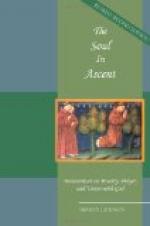In the passage in the Gospel of Matthew, which may be called the parable of the judgment, Jesus taught that the moral order is not changed by the transition from bodily to disembodied existence. The thoughts which men think, and the actions which they perform, affect the substance of the soul. Evil works misery and virtue leads to happiness beyond the grave as well as here. Seed sown on the earth may grow to its harvest in the ages that lie beyond.
This is all the light on this subject that we need now. Death removes no one beyond the watch and care of the infinite love. In the home of the Heavenly Father His children pass from place to place, as He calls. Jesus appeared to those who loved Him, and was recognized by them, and that indicates that, whatever the changes of the future, the spiritual body will be recognized by all who love.
The moral order is universal, and no change will touch the everlasting distinctions between right and wrong, or diminish the obligation to choose the right and refuse the wrong.
These are some of the lessons which are impressed upon us as we meditate upon the life and teachings of Jesus and their relation to the ascent of the soul.
He is the light of all souls. Into the darkness His glory has been extending and expanding from His own time until now. If we may judge the future from the past, it is easy to believe that this radiance will not fail from among men until all realize that life and death, time and eternity, humanity and history, are beset behind and before by the Divine Fatherhood; that the goal of the race is the fullness of Christ; that the severest experiences sometimes achieve the best results; that sin will not forever darken the history of humanity; that death is a passage not an abyss; an opening not a closing; a beginning not an ending; and that beyond stretch opportunities of limitless life and immortal growth.




